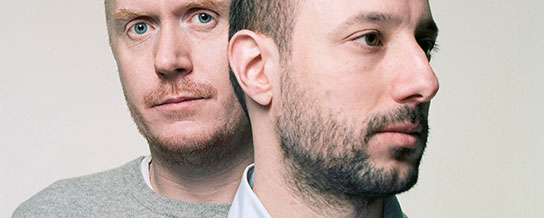Quiet Village: Favorite Movie Scores
Techno-lovin’ soundtrackers Matt “Radioslave” Edwards and Joel Martin of Quiet Village explore their favorite movie […]

Quiet Village: Favorite Movie Scores
Techno-lovin’ soundtrackers Matt “Radioslave” Edwards and Joel Martin of Quiet Village explore their favorite movie […]

Techno-lovin’ soundtrackers Matt “Radioslave” Edwards and Joel Martin of Quiet Village explore their favorite movie scores.
Halloween, 1978
This is a movie that never loses any of its power, much of which is derived from the monumental score. John Carpenter realized his ultimate vision as an auteur in 1978 by not only writing and directing the movie, but by composing the soundtrack (along with Alan Howarth). You know what’s in store when you hear the pulsing drum machine and minimal synth chords. I still have to look behind the curtains to check that Michael isn’t waiting there.
Once Upon a Time in
the West, 1969
The sheer scale of this picture, accompanied by the Ennio Morricone score, truly affected my soul. The real magic occurs when his compositions play alongside the operatic visuals of Sergio Leone. From the muted, almost-dub harmonica solos to the spacious string passages, this is as emotive as it gets.
Wild Side,1995
A twisted thriller by cult director Donald Cammell that stars Christopher Walken, the ultra- sleazy Steven Bauer, Anne Heche, and the sultry Joan Chen, complete with a hauntingly beautiful Ryuichi Sakamoto score, which to this day has never been released. The exquisite electronic pads that the composer utilizes are so well matched to the film’s stark and seductive atmosphere that it makes for compulsive and dangerous viewing.
Excalibur, 1981
I’m not really a fantasy-genre fanatic, but this goes deeper than the rest in many ways. Excalibur moves you simply because it deals in the very essence of the human condition–friendship and betrayal, love and hatred, life and death–backed by a perfectly chosen classical score. Everyone is familiar with Carl Orff’s majestic “O Fortuna” (the Old Spice theme), but the way that director John Boorman uses Richard Wagner’s music is genius.
American Gigolo, 1980
Giorgio Moroder was the only man fit enough for the task of creating the ultimate L.A. soundscape, and he utilizes the disco formula like a pro. The machine-made music marries perfectly with the characters’ coke-stoned comportment as they manipulate and deceive each other with the precision of conscience-free androids.

